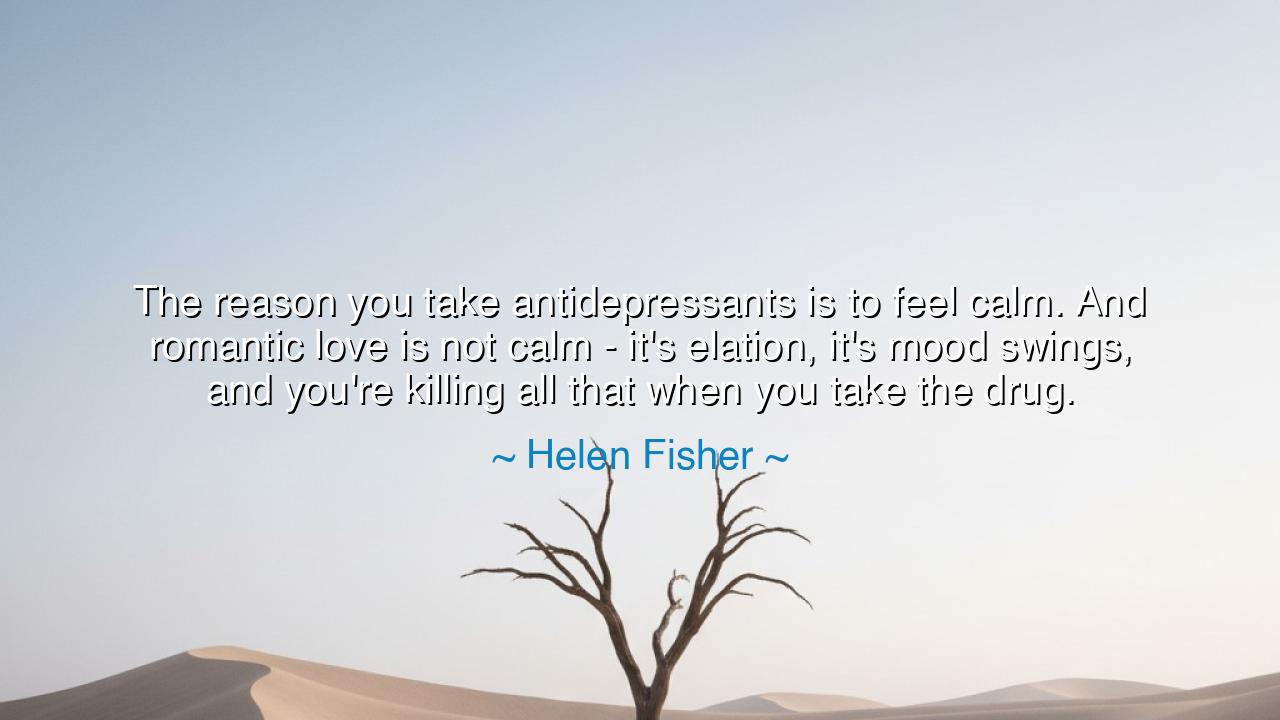
The reason you take antidepressants is to feel calm. And romantic
The reason you take antidepressants is to feel calm. And romantic love is not calm - it's elation, it's mood swings, and you're killing all that when you take the drug.






In the words of Helen Fisher, whose studies delve into the mysteries of the human heart and mind, there is spoken a truth both wondrous and tragic: “The reason you take antidepressants is to feel calm. And romantic love is not calm—it’s elation, it’s mood swings, and you’re killing all that when you take the drug.” These words pierce like an arrow into the paradox of love: that it is not peace we find in passion, but fire, not stability but storm. To seek love is to surrender calmness, to ride the highs and lows that define the beating heart.
The ancients, though they knew not the word “antidepressant,” understood this very struggle. They spoke of Eros as both divine blessing and destructive madness. To be struck by the arrows of Cupid was not to feel calm serenity, but to be consumed with restless energy, to wander sleepless, to soar in joy one hour and collapse in despair the next. The poets praised this madness, for it was proof of being alive, proof that the soul had been seized by something greater than itself. In Fisher’s words, we hear the echo of this ancient truth: love is not calm—it is both torment and ecstasy, and therein lies its power.
Consider the tale of Romeo and Juliet, whose romance still burns through centuries. Their love was no calm meadow—it was lightning, a flame that consumed quickly yet brightly. Every glance was elation, every obstacle despair. Had they been sedated, numbed of their surging moods, their story would not have been tragedy or triumph but dullness, forgotten like countless unlived lives. Fisher reminds us that romantic love thrives on these extremes, and to dull them is to silence its very essence.
Yet there is wisdom, too, in the other side. The taking of antidepressants is not folly, but sometimes necessity. To restore balance to a broken mind is itself an act of survival, a reclaiming of life from despair. But what is gained in steadiness is often purchased at the cost of intensity. Calmness may save the body, but passion, with all its highs and lows, enlivens the spirit. This is the eternal tension: the human soul longs for both serenity and fire, for both the quiet of peace and the storm of love.
History itself bears witness. The great composer Robert Schumann, whose mind was turbulent and unsteady, gave to the world symphonies and songs of unmatched passion. His love for Clara Wieck drove him to soaring compositions, yet his moods also drove him into shadows that consumed him. His art was born of the very mood swings that today might be dulled by medicine. We honor him because he burned brightly, though briefly. And here again, Fisher’s words ring true: passion and calmness do not dwell easily in the same house.
The deeper meaning, then, is not that one should reject medicine, but that one must understand the nature of romantic love: it is not meant to soothe, but to stir, not to settle, but to awaken. Those who seek calmness must look elsewhere; those who seek love must be ready to embrace the storm. To numb oneself against the surges of the heart is to choose safety over passion, survival over rapture. And though safety has its place, passion is what has built songs, stories, and legacies across the ages.
The lesson is clear: do not expect romantic love to be calm, and do not fear its storms. If you are called into its fire, embrace both the sweetness of its highs and the bitterness of its lows. Guard your mind if you must, but know that passion asks for vulnerability, for the willingness to feel deeply even when it hurts. To live without this is to live half-asleep. To live with it is to taste eternity, if only for a fleeting hour.
Therefore, O listener, honor the gift of calm when you must, but never forget that life’s deepest beauty comes not from calmness, but from the blazing, trembling fire of love. It is this storm, unsteady and wild, that reminds us we are alive, and it is in that storm that humanity has always found its greatest songs.






AAdministratorAdministrator
Welcome, honored guests. Please leave a comment, we will respond soon